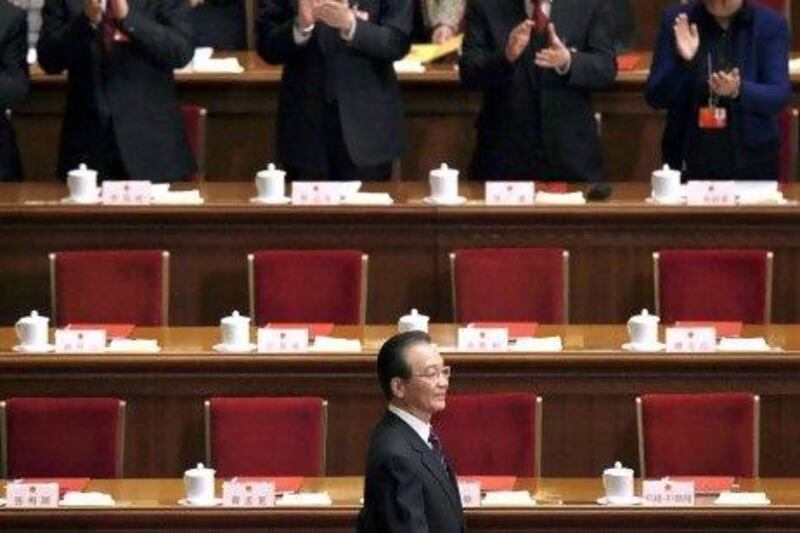BEIJING // China urgently needs reform, the premier, Wen Jiabao, said yesterday, warning without change the world's most populous country and a major economic powerhouse risked another tragedy such as the Cultural Revolution that set the nation back years economically and socially.
Mr Wen also said during a news conference that the Arab Spring revolutions had created "the demand for democracy by the Arab people must be respected and truly responded to".
"I believe this trend towards democracy cannot be held back by any force," he told journalists at the annual National People's Congress parliamentary session, his last major speech as premier. He plans to step down early next year. "I believe China's democratic system will, in accordance with China's national conditions, develop in a step-by-step way. No force can stop this."
China, along with Russia, has vetoed efforts in the UN Security Council to crack down on Syria and the rule of President Bashar Al Assad, but Mr Wen said:
"The killing of civilians must be immediately stopped by all relevant parties in Syria,"
"China respects the legitimate aspirations of the Syrian people for change," he said, adding China had "deep sympathy for the humanitarian plight of the Syrian people".
Mr Wen's comments on the Arab Spring "are quite different from the mainstream political discourse in China", said Li Mingjiang, a Chinese political analyst at the S Rajaratnam School of International Studies in Singapore.
"In the mainstream media and official statements, the Arab Spring is described as something bad, something negative. But Wen Jiabao is clearly sympathetic to the democratic movement in the Arab world," he said.
Mr Wen's apparent sympathy with reform movements in the Middle East comes despite the Chinese authorities continuing to take a tough line over dissent in Tibet and Xinjiang in the west, both of which have movements calling for independence or greater autonomy.
Attempts in China last year to organise demonstrations inspired by the Middle East uprisings were clamped down on in major cities, with a heavy police presence at planned protest sites.
Mr Wen, often described as China's most popular politician and regarded as the country's most liberal leader, has in the past said China needs political reform, although his views have not always been well aired in the state media.
Also, in 1989, he accompanied the Communist Party's then general secretary, Zhao Ziyang, when the latter told protesters in Tiananmen Square to go home, before hardline leaders ordered a brutal crackdown.
Mr Wen's comments yesterday came little more than six months before he steps down from the nine-strong politburo standing committee, China's supreme decision-making body.
He gives up the premiership early next year.
He also yesterday reaffirmed the rights of villagers to hold direct elections to combat "the loss of credibility, corruption and other issues" in their local leadership.
China needs economic and political reform, "especially reform of the Party and the state's leadership system", he said.
"Reform has reached a critical stage. Without the success of political reform, economic reforms cannot be carried out."
"The results that we have achieved may be lost. A historical tragedy like the Cultural Revolution may occur again. Each party member and cadre should feel a sense of urgency."
In the decade-long Cultural Revolution, launched in 1966 by the then leader Mao Zedong, millions were targeted as political fanaticism spread across the country.
Mr Wen has never detailed what he means by political reform and in the past analysts have said that many of his previous public statements in favour of democracy or reform have failed to bear fruit.
But Mr Li suggested he was thinking of a system "somewhere between western democracy and China's current political reality", with the right of villages to hold elections potentially being extended to larger administrative areas. Greater intraparty democracy is also often suggested as being part of Mr Wen's agenda.
"He seems to be open to pluralistic popular elections," said Mr Li, adding Mr Wen's comments "help create some political atmosphere in China that will be more in favour of political reform" even though as part of a collective leadership Mr Wen cannot force through measures on his own.
He may be referring to tackling the "vested interests", such as those in charge of large state-owned enterprises, seen as preventing China from developing a true market economy, said Zhang Baohui, associate professor of political science at Hong Kong's Lingnan University.
"To move forward economically you need to change political by renegotiating the balance of power between the vested interests and society at large. But it's not the introduction of western democracy," Mr Zhang said China should do gradual political change, which means step by step," Mr Zhang said.
In yesterday's three-hour press conference, Mr Wen also apologised for economic and social problems during his period as premier and said China would loosen controls on its currency, a major point of contention in relations with the United States.
dbardsley@thenational.ae






